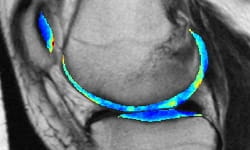
9/21/2020
 PITTSBURGH – Researchers at the University of Pittsburgh School of Medicine and Carnegie Mellon University College of Engineering have created a machine-learning algorithm that can detect subtle signs of osteoarthritis—too abstract to register in the eye of a trained radiologist—on an MRI scan taken years before symptoms even begin. These results will publish this week in PNAS.
PITTSBURGH – Researchers at the University of Pittsburgh School of Medicine and Carnegie Mellon University College of Engineering have created a machine-learning algorithm that can detect subtle signs of osteoarthritis—too abstract to register in the eye of a trained radiologist—on an MRI scan taken years before symptoms even begin. These results will publish this week in PNAS.
 “The gold standard for diagnosing arthritis is x-ray. As the cartilage deteriorates, the space between the bones decreases,” said study co-author Kenneth Urish, M.D., Ph.D., associate professor of orthopaedic surgery at Pitt and associate medical director of the bone and joint center at UPMC Magee-Womens Hospital. “The problem is, when you see arthritis on x-rays, the damage has already been done. It’s much easier to prevent cartilage from falling apart than trying to get it to grow again.”
“The gold standard for diagnosing arthritis is x-ray. As the cartilage deteriorates, the space between the bones decreases,” said study co-author Kenneth Urish, M.D., Ph.D., associate professor of orthopaedic surgery at Pitt and associate medical director of the bone and joint center at UPMC Magee-Womens Hospital. “The problem is, when you see arthritis on x-rays, the damage has already been done. It’s much easier to prevent cartilage from falling apart than trying to get it to grow again.”
 “When doctors look at these images of the cartilage, there isn’t a pattern that jumps out to the naked eye, but that doesn’t mean there’s not a pattern there. It just means you can’t see it using conventional tools,” said lead author Shinjini Kundu, M.D., Ph.D., who completed this project as part of her graduate training in the Pitt Medical Scientist Training Program and Carnegie Mellon Department of Biomedical Engineering.
“When doctors look at these images of the cartilage, there isn’t a pattern that jumps out to the naked eye, but that doesn’t mean there’s not a pattern there. It just means you can’t see it using conventional tools,” said lead author Shinjini Kundu, M.D., Ph.D., who completed this project as part of her graduate training in the Pitt Medical Scientist Training Program and Carnegie Mellon Department of Biomedical Engineering.
PHOTO INFO: (click images for high-res versions)
Top:
CREDIT: Kundu et al. (2020) PNAS.
CAPTION: Spotting Subtle Patterns In Knee Cartilage: The cartilage in this MRI scan of a knee is colorized to show greater contrast between shades of gray.
Middle:
CREDIT: UPMC
CAPTION: Kenneth Urish, M.D., Ph.D., associate professor of orthopaedic surgery at the University of Pittsburgh and associate medical director of the bone and joint center at UPMC Magee-Womens Hospital.
Bottom:
CREDIT: Shinjini Kundu
CAPTION: Shinjini Kundu, M.D., Ph.D., resident physician and medical researcher at the Johns Hopkins Department of Radiology.
















